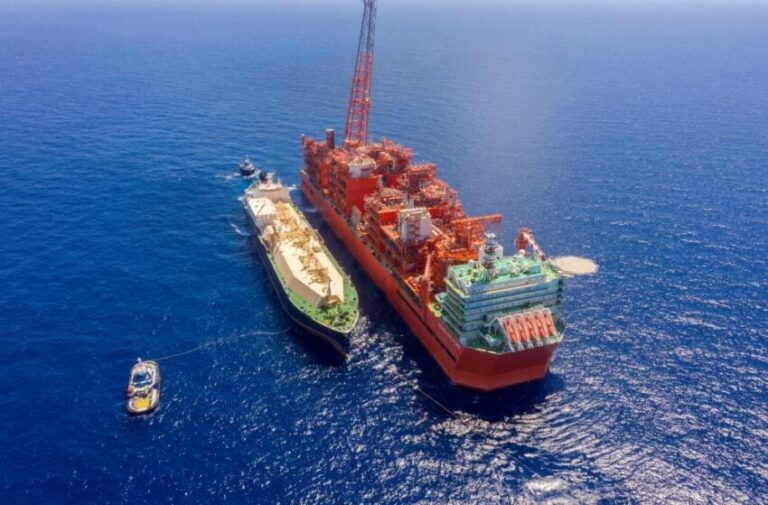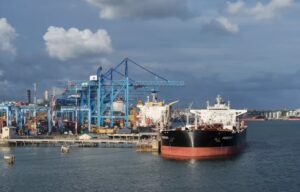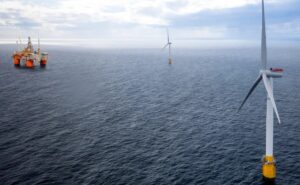Home Fossil Energy Interview: Africa’s oil & gas, renewables, and low-carbon plays set to flourish in the embrace of digitalization
While Africa is undoubtedly bound to see further growth in oil and gas production, with low-carbon and clean energy sources also on the continent’s menu, one of the key tools of this golden opportunity to boost economic growth lies in the rollout of digital technologies to push production to all-time high levels and enhance the set of offerings to navigate and tackle safety, climate, costs, and regulatory complexities. Will Africa pick up a match to set the blazing bonfire of digital transformation alight, going after low-hanging fruits and the biggest impact items in digitalization’s arsenal?

The worsening climate crisis alongside global population growth, ever-growing spikes in energy demand, supply concerns, geopolitical challenges, and cost inflation are combining forces to shape an era of further innovation in multiple arenas, including technology, to respond to these challenges, giving rise to digital evolution in the worldwide offshore energy industry.
In line with this, Africa’s energy ambitions are gaining ground with significant potential for further growth in the continent’s energy market, which can be unlocked with digital tools.
Rich nations and fossil fuel profiteers must contribute their fair share to clean and equitable energy solutions🫰. Taxing the rich would help fund #JustEnergyTransitions in Africa. Although Africa contributes just 4% of global CO2 emissions, it will suffer the most from… pic.twitter.com/2yD6azOvS0 — Center for Citizens Conserving Environment( CECIC) (@cecic_ug) July 22, 2024
Such endeavors will not only strengthen the energy security across the mother of mankind, as the continent is often called but also position it to become an important player in the global energy arena, spearheading the transition to greener fuels while also promoting further evolution in technology to streamline operations with digitalization at the forefront of such efforts.
This, in turn, will enable untapped energy resources across Africa to spring free, bringing a game-changing opportunity to enhance the economy and energy infrastructure safety, ramp up production flows, and curb the environmental impacts of the continent’s energy boom.
-

Posted: about 1 year ago
According to Mordor Intelligence, the Middle East and North Africa (MENA) digital oilfield services market is anticipated to hit around $31.69 billion by year-end, growing to $41.73 billion with the compound annual growth rate (CAGR) surpassing 5.66% during 2024 – 2029. The forecasts show that bringing smaller offshore gas fields in the Mediterranean and the Red Sea online will continue offering a source of growth for the market.
While the boost in upstream production capacity is underway on the world’s energy stage to reap the benefits of the current high-price environment and maximize profits, the jump in renewable energy adoption across the globe is anticipated to curtail the demand for hydrocarbons in the MENA region, restraining the market during the forecast period, based on the market research player’s report.
-

Posted: about 1 month ago
Nevertheless, Global Market Insights (GMI), a market research and consulting firm, projects growth at a CAGR of more than 6.4% between 2024 and 2032 for the Middle East and Africa’s digital oilfield market, valued at $4.8 billion last year.
In a bid to expand digital access and literacy and strengthen digital enabling environments across Africa, U.S. President Joe Biden launched the Digital Transformation with Africa (DTA) initiative in December 2022 to invest over $350 million and help mobilize over $450 million in financing for the continent.
Since the moves to digitalize operational assets support the efforts to fortify asset integrity, increase production levels, and provide employees with technologies that enable collaboration and greater safety, such undertakings are seen as a way to overcome challenges in taking advantage of potential energy opportunities and advancing their development progress.
-

- long read
Posted: about 1 year ago
With the benefits of digitalization in mind, Offshore Energy has explored the role of digital solutions in pushing Africa’s energy industry to new heights through an interview with Adeshina Adebusuyi, Business Development Manager for Africa and Middle East at James Fisher Asset Information Services (AIS), a digital services provider.
Adebusuyi, who sees digital twinning as a blueprint for overcoming the gaps in the digital transformation journey for the oil and gas sector, is an engineer with over 15 years of offshore and onshore experience in the oil and gas industry.
AI could boost Africa’s economy by $2.9T by 2030🚀! — SU Policy Innovation Lab (@SUPolicyLab) July 22, 2024
The @GSMA report reveals how AI could supercharge agriculture, food security, energy, and climate action. Get ready to see the SDGs in action! 💪Check out the GSMA’s website for access to the full report. #AI4Good #AfricaTech pic.twitter.com/MLlM4wHnDn
With a bachelor’s degree in chemical engineering and a master’s degree in oil and gas engineering from the University of Aberdeen, he joined James Fisher AIS in 2019, embarking on a journey to engage with multiple stakeholders in the energy sector to enable the delivery of fast and cost-effective digital transformation for industrial assets across Africa and the Middle East.
James Fisher AIS’s Business Development Manager for these two areas believes that digital solutions are the key to making headway in the endeavors to enable African National Oil Companies (NOCs) to move from production potential to progress, thus, he discusses how the efficiency ante can be upped with digital tools, unlocking NOC’s potential, and overcoming digitalization barriers.
Adebusuyi goes on to expand his view about digital solutions being critical for African NOCs to enhance production while managing costs and regulatory complexities, delving into the whys and hows behind digital technologies’ potential to transform NOCs into the continental leaders in oil and gas production through the optimization of unused capacities.
-

Posted: 10 months ago
He also looks into the region’s digital adoption obstacles and strategies to combat these issues, allowing digitalization to take root and empower Africa’s entire energy industry and supply chain.
Digitalization bringing new dawn to Africa’s energy scene
- OE: Africa is turning into a fast-growing exploration hotspot as new hydrocarbon discoveries pop up. Why should the continent embark on a digitalization quest? What does it stand to gain from such a move? Will the transition to digital operations help oil and gas operators to unlock more hydrocarbons?
Adebusuyi: The rapid increase in hydrocarbon exploration in Africa presents a unique opportunity to integrate multiple available digital technologies into its oil and gas sector. The continent stands to gain significantly if digitalization is fully embraced and some of the overall gains are economic and social benefits, improved safety, and environmental compliance which subsequently increase overall operational efficiency.
In summary, the transition to digitalized operations will not only help in unlocking more untapped hydrocarbon in Africa, but it will also drive the overall development of its oil and gas sector and the continent in the long run.
- OE: Digital twin technology is already being used across the globe to make informed decisions. How will a rise in the level of such deployment across Africa enable National Oil Companies (NOCs) to boost production, ensure safe operations, manage costs more efficiently, navigate regulatory complexities, and achieve greenhouse gas (GHG) emission cuts?
Adebusuyi: Mirroring what is happening in other digitally advanced climates, the rise in the deployment of digital twin solutions across Africa has significant potential to transform NOCs of different countries within the continent in several ways:
- Real-time monitoring, predictive maintenance, and enhanced reservoir management are sure ways of boosting overall hydrocarbon production.
- Ensuring a safe operating environment, deploying digital twin technology in training personnel, and continuously monitoring the physical condition of infrastructure, with digitalized processes to proactively assess risk and manage it will transform the activities of various NOCs within the continent.
- With available digitalization tools used and tested in the Americas and Europe, pinpoint resource allocation and supply chain optimization will lead to overall operational efficiencies eventually reducing their OPEX.
- When navigating regulatory complexities, digitalized scenario analysis for policy impact, helps NOCs to adapt strategies to remain compliant. Digital twins can be used to ensure ongoing compliance with regulatory standards globally by providing real-time data and documentation while also supporting audit and reporting to eliminate any oversight or mistakes.
- Optimization of energy use by modeling consumption patterns and reducing carbon footprint using digital twin solution is already being used by oil and gas players around the globe. Further, digital twins can be used to design, optimize, and monitor carbon capture and storage systems, which ensures effective capture and storage of CO2.
-

- long read
Posted: about 1 year ago
In conclusion, the adoption of digital twin technology in Africa’s NOCs offers a multifaceted approach to enhancing production, cost-efficiency, safety regulatory compliance, and environmental sustainability. This technological advancement provides a competitive edge in the global market and aligns with broader goals of sustainability development and environmental stewardship.
- OE: Africa is said to hold a huge untapped oil and gas potential. Will the pursuit of digital tools allow the continent to move this potential to a production phase and bolster its overall economy?
Adebusuyi: There are several ways in which digital tools can contribute to the advancement of the continent to move its huge untapped oil and gas resources to transform it to the production phase and bolster its general economy. While the potential benefits are significant, several challenges must be addressed and continually discussed by stakeholders to realize these gains fully.
These include the need for infrastructure development, investment in digital literacy and skills training, regulatory support, and the creation of a conducive business environment. Additionally, there must be a concerted effort to ensure that digital advancements do not exacerbate existing inequalities and that their benefits are broadly shared across society.
Overall, the pursuit of digital tools holds substantial promise for unlocking Africa’s untapped oil and gas potential and boosting the overall economy, provided that the necessary infrastructure, skills, and regulatory frameworks are put in place.
- OE: Can digital technologies push NOCs to new highs, turning them into continental kingpins in the oil and gas production arena?
Adebusuyi: By leveraging digital technologies, African NOCs can significantly enhance their operational efficiency, reduce costs, improve safety, and enhance collaboration and overall environmental performance, which helps in making better strategic decisions.
-

- video
Posted: 6 months ago
This will position the NOCs as dominant players in the overall continental oil and gas industry, capable of competing on a global scale. However, achieving this transformation will require significant investment in digital infrastructure, talent development, and digital training, with a supportive regulatory environment.
- OE: How can NOCs optimize unused hydrocarbon capacities and overcome current digitalization challenges in the African region?
Adebusuyi: There are various ways in which NOCs in Africa optimize unused hydrocarbon capacities in the region. These include but are not limited to, advancing oil and gas exploration techniques, and deploying digital twin-enabled technology which will enable integrated asset management and enhanced oil recovery methodologies.
These methods can work well as a catalyst to overcome the identified digitalization challenges currently experienced in the region. Overcoming digitalization challenges in the region includes developing infrastructures, training and workforce development, collaboration and partnerships between all stakeholders, government and regulatory agency support, and pilot project initiatives with appropriate scaling.
-

- long read
Posted: 4 months ago
Emphasis also must be placed on cybersecurity measures, data management, storage, and analytics while putting out the message to folks to embrace the culture of innovation and digital adoption within the oil and gas space.
- OE: Which energy and regulatory moves should be made to enable Africa to reach its decarbonization goals through digital adoption?
Adebusuyi: Different energy and regulatory moves should be made based on individual countries in Africa, but looking at common themes across the continent, some recurring themes appear:
- Promoting renewable energy infrastructure
- Creating a supportive regulatory framework
- Establishing carbon pricing mechanism
- Supporting energy efficiency programs
- Encouraging clean energy innovation through research and development and public-private partnerships
- Enhance data and cybersecurity regulations
- Developing digital infrastructure and energy management systems
-

Posted: 6 months ago
By making these energy and regulatory moves, African countries can create an enabling environment for digital adoption while driving the transition towards a sustainable, decarbonized energy future.
- OE: How much will the digital shift cost NOCs across Africa? Can you offer an estimated investment cost for these companies? What should NOCs do to bankroll the pursuit of the digitalization era on the continent caught in the intertwined web of infrastructure and broader energy policy woes and what should they do to untangle this web?
Adebusuyi: The cost of digital transformation for NOCs in Africa can be significant, involving investments in infrastructure, technology, and workforce development. While the exact cost will vary depending on the scale and scope of digital initiatives, it is crucial for NOCs to adopt strategic approaches to finance these efforts effectively and to navigate the challenges posed by infrastructure and broader energy policy issues.
- OE: What is James Fisher AIS doing to foster the use of digital twins and other similar tools in the emerging low-carbon and renewable energy plays? Could you please tell us a bit more about your ongoing projects in this arena?
Adebusuyi: James Fisher AIS plays a pivotal role in fostering the use of digital twins in the emerging low-carbon and renewable energy sector by participating in industry seminars, events and delivering white papers and research all aimed to educate and raise the awareness of stakeholders to the benefits and application of digital twin solutions in this sector.
We have compiled case studies and success stories to illustrate real-world benefits especially in the North Sea. We also engage and launch pilot projects both singly and with our partners to showcase the effectiveness of digital twins in optimizing operations and maintenance schedules which ultimately increase efficiency.
We have also engaged with regulatory bodies in different countries, such as Angola, Mexico, Trinidad, and Nigeria, to advocate for policies that encourage the adoption of digital twin technologies in the renewable energy sector. What we aim for as a company is to drive innovation, efficiency and sustainability processes.
- OE: Do you believe that global efforts toward accelerating digitalization will help pave the way for a reduction in the overall carbon footprint and bring the world closer to a more sustainable future?
Adebusuyi: Yes, global efforts towards accelerating digitalization can significantly contribute to reducing the overall carbon footprint and advancement towards a more sustainable future.
This can be achieved through, and not limited to, enhanced energy efficiency methodologies, transportation sector transformation, optimized renewable energy deployment, industrial process optimization, circular economy enablement, and energy storage with grid integration.
-

Posted: 6 months ago
By enhancing efficiency, optimizing resource use, and facilitating the integration of renewable energy sources, digital technologies can play a crucial role in reducing global carbon emissions and paving the way towards a more sustainable future.
- OE: Given the current flashing signs and blaring alarms over the lack of speed in the energy transition journey, are the current net zero targets achievable, and if so what needs to be done in your view to make this happen? How can digital technology push the decarbonization envelope further?
Adebusuyi: Achieving current net-zero targets is ambitious but not impossible. Purposeful policy measures, significant shifts in societal behavior, and substantial investments in technology will be key to achieving the set targets.
While the current pace of the energy transition is insufficient, digital technology offers a powerful tool to optimize energy use, integrate renewable sources, and drive efficiencies across all sectors, making the path to a sustainable future more achievable.
- OE: Thank you for this interview! Are there any other aspects of a digital future in the energy industry that you would like to spotlight?
Adebusuyi: Digital technologies are changing all the time, some areas that we are already exploring and seeing the benefits of include human/machine collaboration, digital customer engagement, cybersecurity measures, artificial intelligence, and machine learning.
-

- long read
Posted: 4 months ago
Offshore Energy’s interview with Adebusuyi points out how digitalization can boost Africa’s energy potential. Given the new technologies’ ability to bring further insight into all areas of businesses and reshape every aspect of operations, the technological landscape of the continent’s energy industry is poised to evolve rapidly.
This means it will go from exploration undertakings to extraction activities and resource management, robotics, artificial intelligence (AI), and data analytics to unleash higher efficiency, cost savings, and sustainability across the entire value chain.
Will Africa press the digitalization button to carve a prominent spot in the global oil and gas industry and the worldwide energy transition momentum to net zero?

ADVERTISE ON OFFSHORE ENERGY
𝐃𝐨 𝐲𝐨𝐮 𝐰𝐚𝐧𝐭 𝐭𝐨 𝐠𝐫𝐚𝐛 𝐭𝐡𝐞 𝐚𝐭𝐭𝐞𝐧𝐭𝐢𝐨𝐧 𝐨𝐟 𝐲𝐨𝐮𝐫 𝐭𝐚𝐫𝐠𝐞𝐭 𝐚𝐮𝐝𝐢𝐞𝐧𝐜𝐞 𝐢𝐧 𝐨𝐧𝐞 𝐦𝐨𝐯𝐞? 𝐋𝐨𝐨𝐤 𝐧𝐨 𝐟𝐮𝐫𝐭𝐡𝐞𝐫 𝐭𝐡𝐚𝐧 𝐎𝐟𝐟𝐬𝐡𝐨𝐫𝐞 𝐄𝐧𝐞𝐫𝐠𝐲! 𝐎𝐮𝐫 𝐜𝐨𝐧𝐭𝐞𝐧𝐭 𝐢𝐬 𝐫𝐞𝐚𝐝 𝐛𝐲 𝐭𝐡𝐨𝐮𝐬𝐚𝐧𝐝𝐬 𝐨𝐟 𝐩𝐫𝐨𝐟𝐞𝐬𝐬𝐢𝐨𝐧𝐚𝐥𝐬 𝐞𝐧𝐠𝐚𝐠𝐞𝐝 𝐢𝐧 𝐨𝐢𝐥 & 𝐠𝐚𝐬, 𝐦𝐚𝐫𝐢𝐭𝐢𝐦𝐞, 𝐨𝐟𝐟𝐬𝐡𝐨𝐫𝐞 𝐰𝐢𝐧𝐝, 𝐠𝐫𝐞𝐞𝐧 𝐦𝐚𝐫𝐢𝐧𝐞, 𝐡𝐲𝐝𝐫𝐨𝐠𝐞𝐧, 𝐬𝐮𝐛𝐬𝐞𝐚, 𝐦𝐚𝐫𝐢𝐧𝐞 𝐞𝐧𝐞𝐫𝐠𝐲, 𝐚𝐥𝐭𝐞𝐫𝐧𝐚𝐭𝐢𝐯𝐞 𝐟𝐮𝐞𝐥𝐬, 𝐬𝐡𝐢𝐩𝐩𝐢𝐧𝐠, 𝐚𝐧𝐝 𝐨𝐭𝐡𝐞𝐫 𝐢𝐧𝐝𝐮𝐬𝐭𝐫𝐢𝐞𝐬 𝐨𝐧 𝐚 𝐝𝐚𝐢𝐥𝐲 𝐛𝐚𝐬𝐢𝐬.
Follow Offshore Energy’s Fossil Energy market on social media channels:





